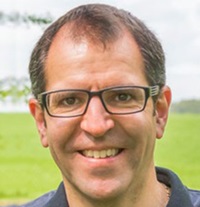In a new series, members of the SCI Mid-Career group offer advice on career management, and how to overcome career challenges.

Please tell us about yourself and your career journey.
My career began with Rhône Poulenc Agriculture, following the completion of A-levels. During my time there I successfully completed a degree in Applied Chemistry through part time study.
My initial work at Rhône Poulenc focused on lead optimization of selective herbicide derivatives, and I developed a broad range of practical chemistry techniques. As automated chemistry techniques were just becoming popular, I was able to work with solid phase chemistry along with early robotics to support solution and solid phase chemistry.
The late 1990’s, was a time of many mergers and acquisitions in the pharmaceutical and agrochemical sectors and sadly Rhône Poulenc’s UK site was closed. Following the initial shock, and after some reflection, I concluded that this as a good opportunity to progress.
My next role was with Scynexis, a start-up CRO company developing a platform to prepare and purify 10,000-member solution phase libraries. While there, I developed expertise in testing new literature methodology for its potential to be used in array synthesis. Along with this I was involved in the planning and synthesis of libraries utilising automation and developing new methods to facilitate parallel synthesis. This work continues to influence the way I conduct chemistry to this day.
As I developed at Scynexis, I realized that a larger company would provide greater opportunities and learning potential. I moved to GSK where I joined the early stage chemistry group, initially focusing on high throughput screening work up and hit to lead chemistry. I have spent several years in this area, building up experience in false positive identification and property-based drug design. Working at GSK has enabled me to gain experience in a range of drug discovery areas, including a secondment to the biophysics group, where I set up a size exclusion chromatography-based assay.
What are the key things you do to manage your career at the mid-career stage?
Mid-career is time to build on early foundations, however there can be reduced structure, and the development opportunities are more diverse. So whilst the support from local management and the company is critical to help enable opportunities there is a bigger requirement from the individual to start and maintain development activities. Mentors enable you to have in depth discussions with people who have a broad range of experience and outlooks. Working with a Job Plus coach was very useful. The sessions helped me understand the reasons behind my difficulties in approaching certain situations and assisted me in discovering my own solutions. This experience also helped me understand how I was perceived by others and to become more open to receiving and acting upon feedback.
Often, in the mid-career stage, responsibilities across the board increase. This means it can feel that there is less time for personal development and gathering the required motivation can be harder.
The key for me was to become more open minded and pro-active about new opportunities and setting myself specific goals. Over the last few of years, I have taken an active role in the recruitment and supervision of apprentices. I also have responsibility for chemistry outsourcing and introduced a purification service into my department. This has ensured that I am continually exposed to new experiences, challenges and opportunities.
What are your challenges around mid-career support?
At the mid-career point, individuals can find that their supervisory and project management responsibilities increase. However, in many cases the management training is not always readily available, and individuals need to rely on the experience they have built up. Online training courses have improved the availability of material but, in my experience, courses that enable discussion between peers are the most valuable. I was fortunate to be given the opportunity to complete a Team Leader Apprenticeship at GSK. The learning was completed with a group of diverse individuals, sharing experiences was both impactful and motivational.
Time can be a factor when seeking to take full advantage of opportunities. However, it is something that can be managed, and I have found GSK to be very supportive in providing time to help me achieve my development objectives. Improvements in my own time management skills and support from family, has enabled me to achieve significantly more than I had expected.
What has been useful or what could be of interest at the mid-career stage that SCI might be able to offer?
The SCI Mid-career events I have attended have been enjoyable and useful. The opportunity to discuss career progression with peers from other companies has been invaluable. I have found that similar issues are faced across a range of industries and going forward it would be good to learn how different organizations tackle similar issues. I have also gained insights from those further on their career, describing how they approached the middle period of their careers.
I would like the mid-career group to have sessions where peers could share how they have approached their career progression and the issues they have faced. An expanded network and continuation of events, along with face-to-face and online discussions and networking would be very useful.
